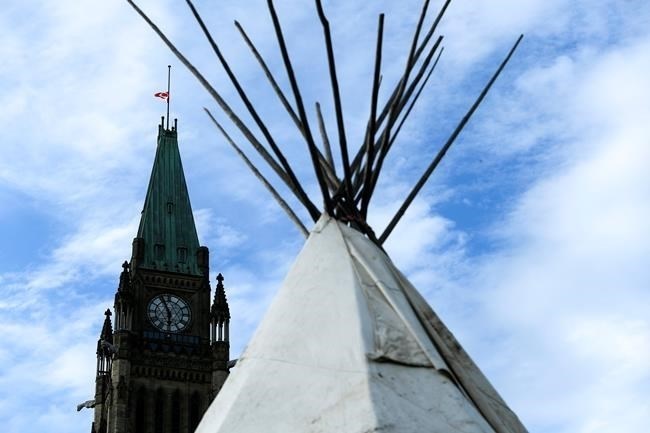
A teepee is seen on Parliament Hill in Ottawa, on Thursday, Aug. 19, 2021. Chief Lynn Acoose of Zagime Anishinabek, home to several First Nations in southeastern Saskatchewan, has filed a proposed class-action lawsuit against the federal government.
Image Credit: THE CANADIAN PRESS/Justin Tang
February 10, 2024 - 12:30 PM
REGINA - Chief Lynn Acoose says she's taking a step elders and past Indigenous leaders in her community have long been reluctant to.
The chief of Zagime Anishinabek, home to several First Nations in southeastern Saskatchewan, has filed a proposed class-action lawsuit against the federal government. The suit alleges Ottawa has not kept its end of the bargain over annuity payments after signing Treaty 4 nearly 150 years ago.
Chief Derek Nepinak of Minegoziibe Anishinabe in west-central Manitoba is also a plaintiff in the lawsuit, filed this month in Federal Court. Chief Murray Clearsky of Waywayseecappo First Nation filed in January a similar proposed class-action against Ottawa in Manitoba Court of King's Bench.
"We are doing something our elders have counselled us against," Acoose said in an interview this week.
"What they didn't want was for the spirit and intent of the treaty to be fixed by a decision."
"I feel a very big risk for me, but it's a risk I'm willing to take."
The allegations have not been proven in court, and no statements of defence have been filed.
In September 1874, Canada signed Treaty 4 with various Saulteaux, Cree and other First Nations in Fort Qu'Appelle, Sask. It allowed the Crown to use and occupy 195,000 square kilometres of land in what's now southeastern Alberta, southern Saskatchewan and west-central Manitoba.
In exchange, the federal government was to set aside land for reserves and pay $750 per year in powder, shot and twine. It was also to provide a school, various tools and supplies.
And it was to pay an annuity of $5 per year to each man, woman and child.
The lawsuits allege the federal government has breached its obligations by failing to increase annuities in a way that maintains their value.
The documents say annuities have never increased with the rate of inflation, and First Nations believed they were to have the same purchasing power as they did 150 years ago.
The lawsuits say First Nations did not know the real value of the annuities would reduce with the passage of time.
"That $5 was not a token amount," Acoose said.
"Why would we agree to that? Our ancestors knew what we were giving up."
She said during treaty negotiations, everyone understood annuities would let members purchase goods and resources that would help them survive.
"The legal argument we are making is that the spirit and intent of treaty means the benefits of treaty would remain equitable throughout the years going forward," Acoose said.
"There's a big different between what was written in the text of treaty and the promises that were made."
"An oral promise back then was just as good as a legal document."
The lawsuits say the federal government should pay $100 million in punitive damages or a sum the court deems appropriate.
They say it should also raise the rate of annuities to reflect their real value.
A spokesperson for Crown-Indigenous Relations and Northern Affairs Canada said in an emailed statement it's aware of the lawsuits and is reviewing them to determine next steps.
Honouring treaty relationships and working together in partnership is key to advancing reconciliation, said the statement.
"Canada recognizes that more needs to be done to renew the treaty relationship and remains open to looking at ways to advance this important work."
Chiefs of other First Nations have previously filed similar claims.
Last summer, the federal and Ontario governments offered a settlement of $10 billion to First Nations in the Robinson Huron Treaty after its members filed a lawsuitarguing their $4 annuity should have been increased over time.
A year ago, members of Treaty 1 filed a proposed class action over annuities not rising with the rate of inflation. Ottawa has asked court to dismiss that case. In 2011, the federal government offered Roseau River First Nation in southern Manitoba a settlement of $80 million to resolve a land dispute.
Acoose said her community did not file a lawsuit years ago because leadership has been reluctant to take treaty rights to court.
"This has been a discussion that has gone on for generations," she said.
"We're now entering into one of the hardest economic periods that we've seen in a long time. And we just think we can no longer be the poorest people in our own territory anymore."
She said her community needs the federal government to treat its members equitably. Better education, health care and resources for people to start businesses would help, she added.
People in the community are working hard to help improve the lives of members, Acoose said.
"I'm done being patient with the Crown stalling and avoiding to deal with their obligations.
"I see no willingness on the part of the Crown to hold up the honour of the Crown in the same way our people have."
This report by The Canadian Press was first published Feb. 10, 2024.
News from © The Canadian Press, 2024